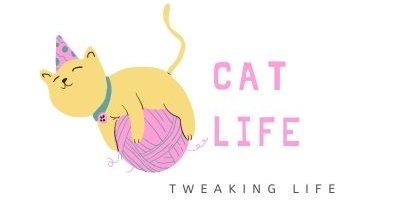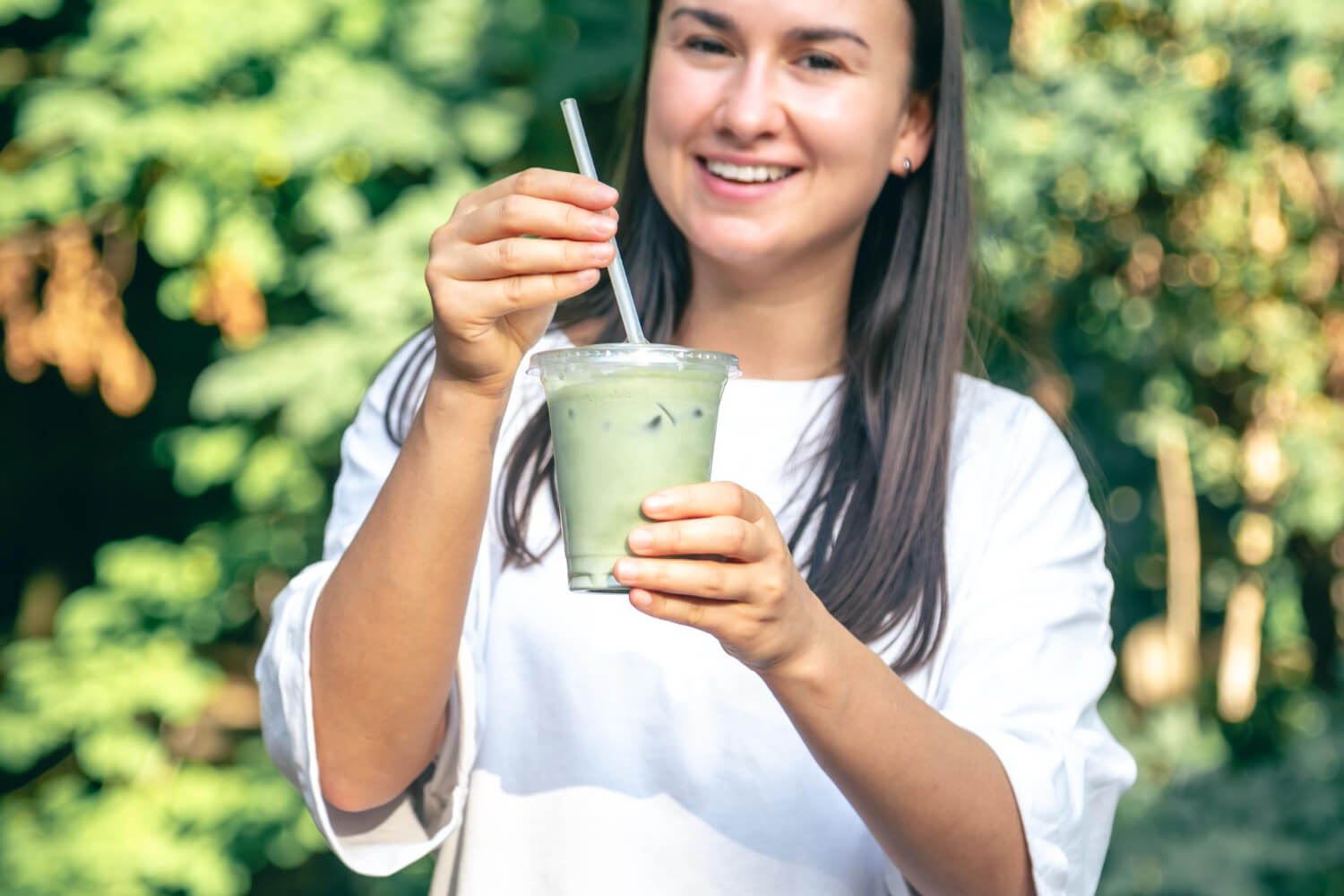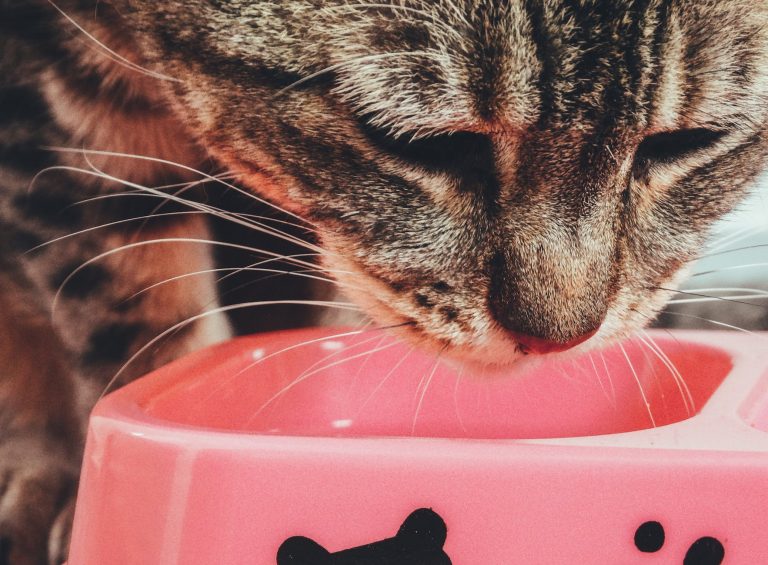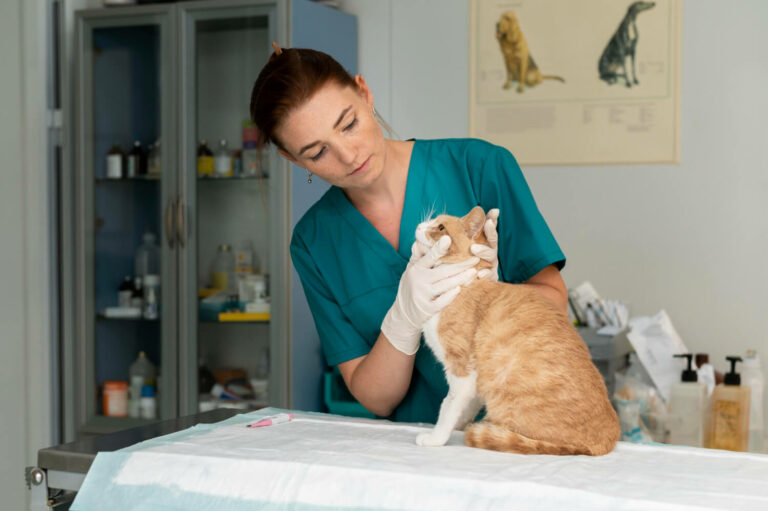Is Matcha Safe for Cats? 5 Reasons Why You Should Not Give Your Cat Matcha
When it comes to our feline friends, ensuring their safety and well-being is always a top priority. And you know, when your cat meows for something, you just need to let them try it.
As cat owners, we often find ourselves wondering about the safety of various human foods and drinks when it comes to our pets.
One such item that has piqued the interest of many cat owners is matcha. But is matcha safe for cats?
Let’s delve into this question, examining aspects such as the potential health effects, the role of caffeine, and what veterinary guidance suggests.
Key Takeaways:
- Matcha contains caffeine, which can be toxic to cats even in small amounts, leading to symptoms like restlessness, rapid breathing, heart palpitations, muscle tremors, and severe neurological effects.
- Ingesting matcha can cause vomiting, diarrhea, increased heart rate, and in severe cases, seizures or collapse. The severity depends on the amount ingested and the size and health of the cat.
- The antioxidants and nutrients in matcha that benefit humans do not provide the same benefits to cats due to their different dietary needs and metabolic processes.
- If a cat ingests matcha, monitor for symptoms of caffeine toxicity, such as hyperactivity and gastrointestinal distress. Contact a veterinarian immediately for guidance.
- What is Matcha?
- Matcha and Cats: Is Matcha Safe for Cats?
- Health Effects of Matcha on Cats
- Symptoms of Caffeine Toxicity in Cats
- Seek Veterinary Guidance if Your Cat Drunk Matcha
- Why Cats Should Avoid Matcha
- Practical Tips for Cat Owners
- What to Do If Your Cat Ingests Matcha
- Alternative Treats for Cats
- Maintaining a Pet-Safe Home Environment
- Conclusion
- FAQ
What is Matcha?
Matcha, a finely ground powder made from specially grown and processed green tea leaves, has become increasingly popular for its vibrant color, unique flavor, and purported health benefits for humans.
Matcha has a high concentration of antioxidants, vitamins, and minerals. However, just because something is beneficial for humans doesn’t necessarily mean it is safe for cats.
Understanding the specifics of matcha consumption and its health effects on cats is crucial for any responsible pet owner.
Matcha and Cats: Is Matcha Safe for Cats?
When considering the safety of matcha for cats, one of the primary concerns is its caffeine content. Caffeine, a natural stimulant found in various plants, including tea leaves, can have adverse effects on cats.
Unlike humans, cats are much more sensitive to caffeine, which can lead to toxicity even in small amounts.
The Issue of Caffeine
Cats metabolize caffeine differently than humans. The stimulant can cause a range of health issues in cats, from mild symptoms like restlessness and rapid breathing to more severe problems such as heart palpitations and muscle tremors.
Given that matcha contains caffeine, although in lower amounts compared to coffee, it still poses a potential risk to cats. Therefore, any consumption of matcha by cats should be approached with caution.
Health Effects of Matcha on Cats
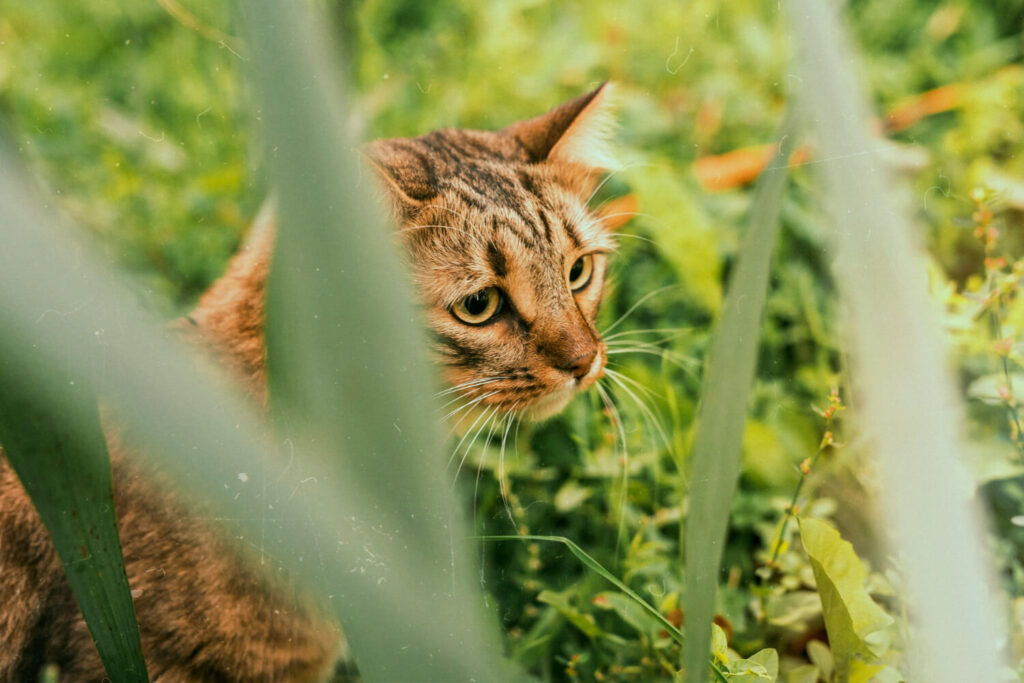
Potential Toxicity
The toxicity of caffeine in matcha is a significant concern. Even a small amount of caffeine can lead to symptoms of toxicity in cats, including vomiting, diarrhea, increased heart rate, and in severe cases, seizures or collapse.
The severity of these symptoms depends on the amount of caffeine ingested and the size and health of the cat.
Lack of Nutritional Benefit
While matcha is celebrated for its health benefits in humans, such as boosting metabolism and providing antioxidants, these benefits do not necessarily translate to cats. Cats have different nutritional needs and their bodies do not process nutrients in the same way humans do. Therefore, any potential health benefits of matcha for cats are largely negligible.
How Much Caffeine is Harmful?
The level of caffeine that can be harmful to cats is relatively low compared to what humans can tolerate. Even a small amount of caffeine, such as that found in a single teaspoon of matcha powder, can cause adverse effects in cats.
To put it into perspective, while humans might enjoy a cup of matcha tea for its calming yet energizing effects, the same amount can be quite dangerous for a cat.
According to veterinary experts, the toxic dose of caffeine in cats is approximately 20 mg per kilogram of body weight. Given that a typical serving of matcha contains around 35 mg of caffeine per gram, even a small amount can easily exceed the safe threshold for an average-sized cat.
Symptoms of Caffeine Toxicity in Cats
Caffeine toxicity can manifest quickly in cats. Early signs of toxicity include restlessness, hyperactivity, and rapid breathing.
These symptoms are often accompanied by a noticeable increase in heart rate. If your cat appears unusually energetic or agitated after possibly consuming matcha or any other caffeinated product, it’s crucial to monitor them closely.
As caffeine toxicity progresses, more severe symptoms can develop. These include muscle tremors, seizures, and even collapse. Gastrointestinal distress, such as vomiting and diarrhea, is also common.
In extreme cases, caffeine toxicity can lead to coma or death if not promptly treated. Recognizing these symptoms early and seeking immediate veterinary care can be lifesaving.
Seek Veterinary Guidance if Your Cat Drunk Matcha
If you suspect your cat has ingested matcha or any caffeinated substance, contact your veterinarian immediately. Veterinary guidance is critical in such situations.
The vet may recommend inducing vomiting if the ingestion was recent or may administer activated charcoal to limit further absorption of caffeine in the stomach and intestines.
Veterinary care doesn’t stop at initial treatment. Continuous monitoring of your cat’s heart rate, blood pressure, and overall condition is essential.
In some cases, hospitalization might be necessary to ensure your cat receives the necessary supportive care, such as intravenous fluids and medications to control symptoms like seizures.
Why Cats Should Avoid Matcha
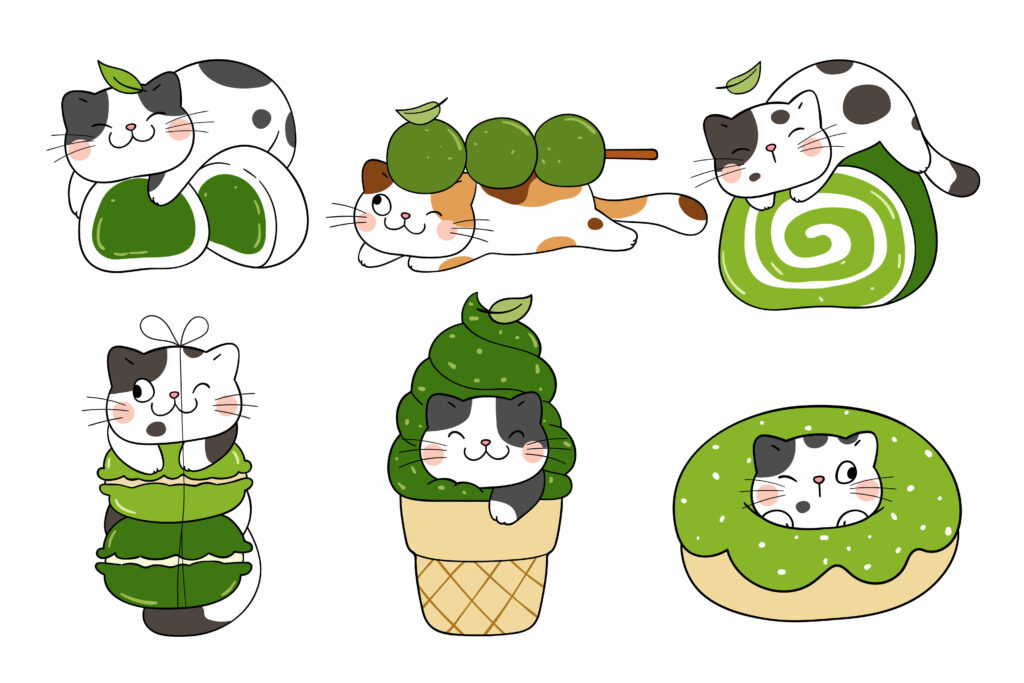
No Health Benefits for Cats
While matcha is touted for its health benefits in humans, these do not extend to cats. Cats have unique dietary requirements and metabolic processes that differ significantly from humans.
The antioxidants and other beneficial compounds in matcha do not provide the same benefits to cats and, given the potential for caffeine toxicity, the risks far outweigh any theoretical advantages.
Safer Alternatives
Instead of offering matcha, consider providing your cat with cat-safe treats and supplements designed specifically for feline health. These alternatives are formulated to meet the nutritional needs of cats without the risk of toxicity.
Practical Tips for Cat Owners
To prevent accidental ingestion, store matcha and other caffeinated products in secure, cat-proof locations.
Cats are naturally curious and may be drawn to the scent or taste of new foods and drinks, so ensuring these items are inaccessible can prevent potential health scares.
Ensure that everyone in your household is aware of the dangers that matcha poses to cats.
This includes educating children about not sharing their drinks with pets and making sure that guests are also informed about keeping caffeinated products away from their feline friends.
What to Do If Your Cat Ingests Matcha
If you discover that your cat has ingested matcha, immediate action is really important for your cat’s health. Here are the steps you should take:
- Assess the Situation: Determine how much matcha your cat has consumed and try to estimate the time since ingestion. This information will be valuable for your veterinarian.
- Contact Your Veterinarian: Call your vet as soon as possible. Provide details about the ingestion, including the amount of matcha and the size and weight of your cat.
- Follow Veterinary Instructions: Your vet may instruct you to bring your cat in for examination and treatment. They might also give you initial steps to perform at home, such as inducing vomiting if the ingestion was very recent.
Veterinary Treatment
At the veterinary clinic, the treatment plan will depend on the severity of the caffeine toxicity. Possible treatments include:
- Activated Charcoal: To prevent further absorption of caffeine in the stomach and intestines.
- Intravenous Fluids: To help flush the caffeine out of your cat’s system and maintain hydration.
- Medications: To control symptoms like seizures, muscle tremors, or an irregular heartbeat.
Alternative Treats for Cats
While matcha is not safe for cats, there are many other cat treats and supplements that are both safe and beneficial for your cat. Here are some alternatives:
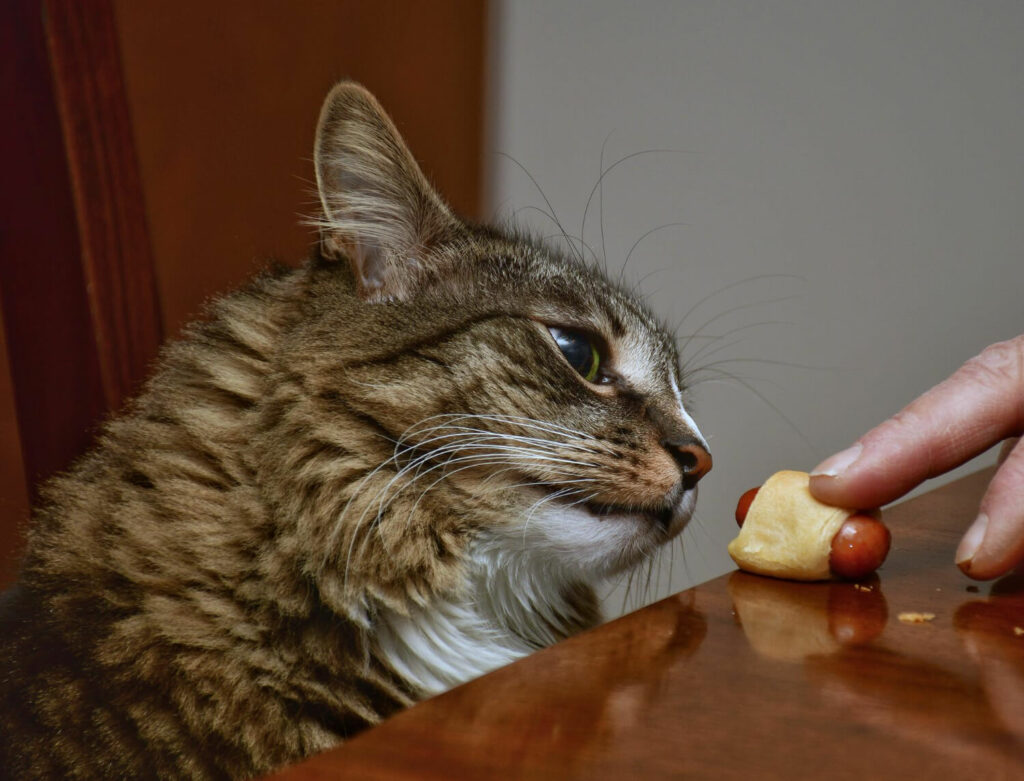
Catnip and Cat Grass
- Catnip: Many cats love catnip, and it is perfectly safe for them. It can provide a stimulating and enjoyable experience for your cat.
- Cat Grass: Cat grass can aid in digestion and provide a safe way for cats to get some greens in their diet.
Commercial Cat Treats
- Healthy Cat Treats: Opt for treats specifically designed for cats. You should watch out for options that are low in calories and high in protein.
- Dental Treats: These treats can help keep your cat’s teeth clean while providing a tasty snack.
Maintaining a Pet-Safe Home Environment
Creating a safe environment for your cat involves more than just avoiding matcha. Here are some tips to ensure your home is free from potential hazards:
- Keep Hazardous Items Out of Reach: Store all caffeinated products, including matcha, coffee, and tea, in cabinets or places your cat cannot access.
- Use Child-Proof Latches: Consider using child-proof latches on cabinets to prevent curious cats from getting into potentially dangerous items.
- Educate Household Members: Make sure everyone in your home knows which foods and substances are dangerous to cats.
- Inform Guests: When you have visitors, inform them about keeping their food and drinks out of reach from your pets.
Conclusion
As much as we love our cats and enjoy sharing our lives with them, it’s important to remember that not all human foods and beverages are safe for our pets. Matcha, with its caffeine content, poses a significant risk to cats and should be avoided.
Always prioritize your cat’s health and safety by keeping potentially harmful substances out of reach and consulting your veterinarian if you have any concerns about your pet’s diet.
FAQ
To summarize and address common questions, here are some frequently asked questions about matcha and its effects on cats:
What is Matcha?
Matcha is a finely ground powder made from specially grown and processed green tea leaves, known for its vibrant color and health benefits in humans.
Is Matcha Safe for Cats to Consume?
No, cats should not consume matcha due to its caffeine content, which can be harmful to them.
Is Matcha Toxic to Cats?
Yes, matcha can be toxic to cats because of its caffeine content, which can cause a range of health issues from mild to severe.
Does Matcha Offer Any Benefits for Cats?
No, the health benefits of matcha for humans do not apply to cats, and the risks of caffeine toxicity far outweigh any potential benefits.
What Are the Risks of Giving Matcha to Cats?
The risks include caffeine toxicity, which can lead to symptoms such as restlessness, rapid breathing, muscle tremors, seizures, and even death.
Does Matcha Contain Caffeine, and Is It Harmful to Cats?
Yes, matcha contains caffeine, which is harmful to cats even in small amounts.
How Does Matcha Affect a Cat’s Health?
Matcha can negatively affect a cat’s health by causing symptoms of caffeine toxicity, including gastrointestinal distress, increased heart rate, and severe neurological effects.
What Should I Do If My Cat Ingests Matcha?
Contact your veterinarian immediately, provide details about the ingestion, and follow their instructions for treatment.
